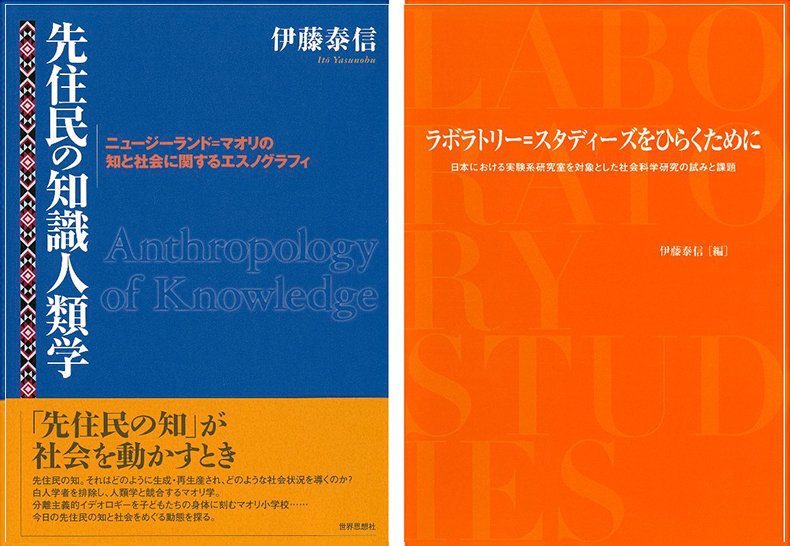
Intellectual discoveries through field-oriented research
Laboratory on Anthropology of Service Design
Professor:ITO Yasunobu
E-mail:
[Research areas]
Cultural Anthropology, Sociology of Knowledge, Ethnography
[Keywords]
Science and Technology Studies, Medical Anthropology, Business Anthropology, Anthropology of Service Design
Skills and Background we are looking for in Prospective Students
Specific knowledge and skills are not required. If anything it is the readiness to pay attention to the complex society where there may not be only one answer to the problem, requiring an attitude to move away from thinking in the conventional arithmetical approach.
What you can expect to learn in this laboratory
Our lab researches on the knowledge of various communities and organizations from the social scientific viewpoint (mainly cultural anthropology/sociology). Students can gain the ability to grasp phenomena in social scientific way and develop research skills in ethnography. In companies, hospitals, schools or universities, and research institution laboratories, there exist things which are obviously taken for granted (or so called undisputable knowledge which goes unquestioned).These could be described and analyzed by ethnography using “defamiliarization” and “reframing” methods. Ethnography is useful in discovering latent needs at the field site and provides insights by digging up the hidden unmet needs of consumers in their daily lives. To this end, ethnography is prized in business and engineering design and has led to hiring of ethnographers in large corporations in Japan and North America. Students will develop these skills in the lab.
【Job category of graduates】 Sales engineering, Consulting, Marketing Research, and UX Design
Research outline

(Left) ITO, Yasunobu, 2007, An Anthropology of Knowledge of An Indigenous People: A New Zealand Maori Knowledge and Society Ethnography. Sekaishisosya Press (The Japanese Society for Oceanic Studies Award for Best Publication by Young Scholars of the Year)
(Right) ITO, Yasunobu (ed.), 2009, For Laboratory Studies: Social Scientific and Ethnographic Research on Experimental Laboratories in Japan. JAIST Press.
Ethnography:
Though ethnography (field-oriented qualitative research) originally was a methodology used by cultural anthropologists for detailed investigation of simple traditional societies, it is currently widely implemented in the fields of business administration, medicine, nursing, and research in science and technology. Recently, for example, industries and businesses are using ethnography to find out consumer insights in their marketing research. While cultural anthropologists were rather hesitant in applying ethnography in business areas thus far, if ethnography–method of anthropology is to become useful in the true sense of the word in industries and business areas, it is necessary to raise ethnography to a new level both academically and practically. Bear this aspect in mind when proceeding with your research as contributing to society on the one hand and pioneering untapped potentials in ethnography on the other hand, are both significantly important.
Unique Study of Cultural Anthropology in Inter-disciplinary Environment:
In Japan, there are many graduate schools that teach cultural anthropology (in the strict sense of the word) and sociology. However, at Japan Advanced Institute of Science and Technology (JAIST) graduate course where undergraduate major is not questioned, it offers anthropological study in an inter-disciplinary environment where students can reap unique research results quite unlike any other universities. For example, a student who holds a bachelor’s degree in science (such as engineering) decides to study cultural anthropology or sociology in our laboratory can apply what he has learned in his undergraduate studies in the manufacturing plant and attempt to use ethnography to extract field-site issues. These kinds of attempts involve untapped possibilities in producing unique ethnography research that is not possible by students who majored in anthropology or sociology.
Key Publications
- OTANI, Kagari and Yasunobu ITO, 2021, “As Normal” Co-created by Visiting Nurses and Patients: Ethnographic Study on Visiting Nurse Station in Japan. Christine Leitner et al. (eds) Advances in the Human Side of Service Engineering, AHFE 2021. Lecture Notes in Networks and Systems, vol. 266, Springer, 503-9.
- ITO, Yasunobu, 2020, Contact Zone of Anthropology of and in Business: Inspiring Synergy between Anthropology and Industry in Japan. Japanese Review of Cultural Anthropology 20(2): 7-25.
- ITO, Yasunobu, 2016, “Ethnography” in Japanese Corporate Activities: A Meta-anthropological Observation on the Relationship Between Anthropology and the Outside, H Nakamaki et al. (eds) Enterprise as an Instrument of Civilization, Springer, 55-72.
Teaching policy
Whether you are a researcher or a business person, it is not easy to think outside of the box. Cultural anthropology and its methodology (ethnography) are distinguished in unwinding your preconceived thoughts, and “reframing” your way of looking at things. In our lab, we aim to cultivate students to apply the methodologies with sociological viewpoint. In addition, the agenda of our unique lab covers the review of basic literatures in order for students to gain fundamental knowledge of cultural anthropology and sociology.